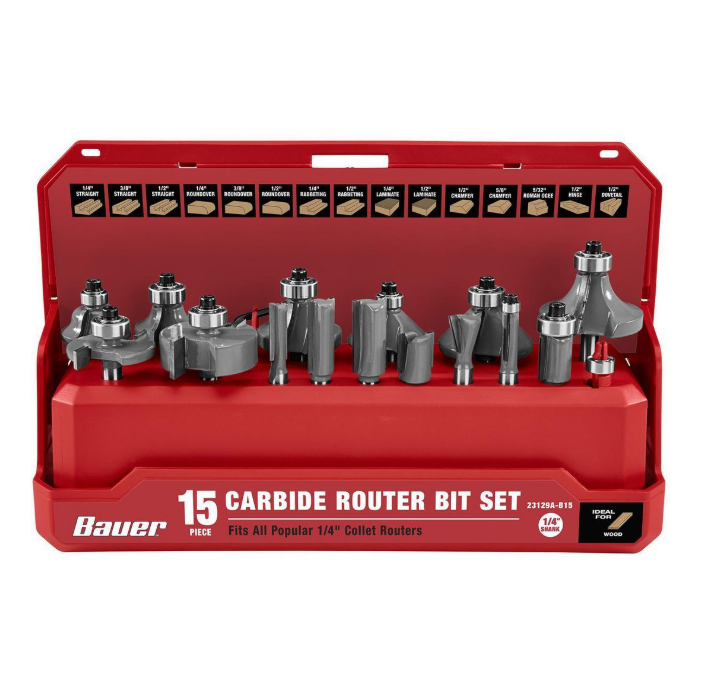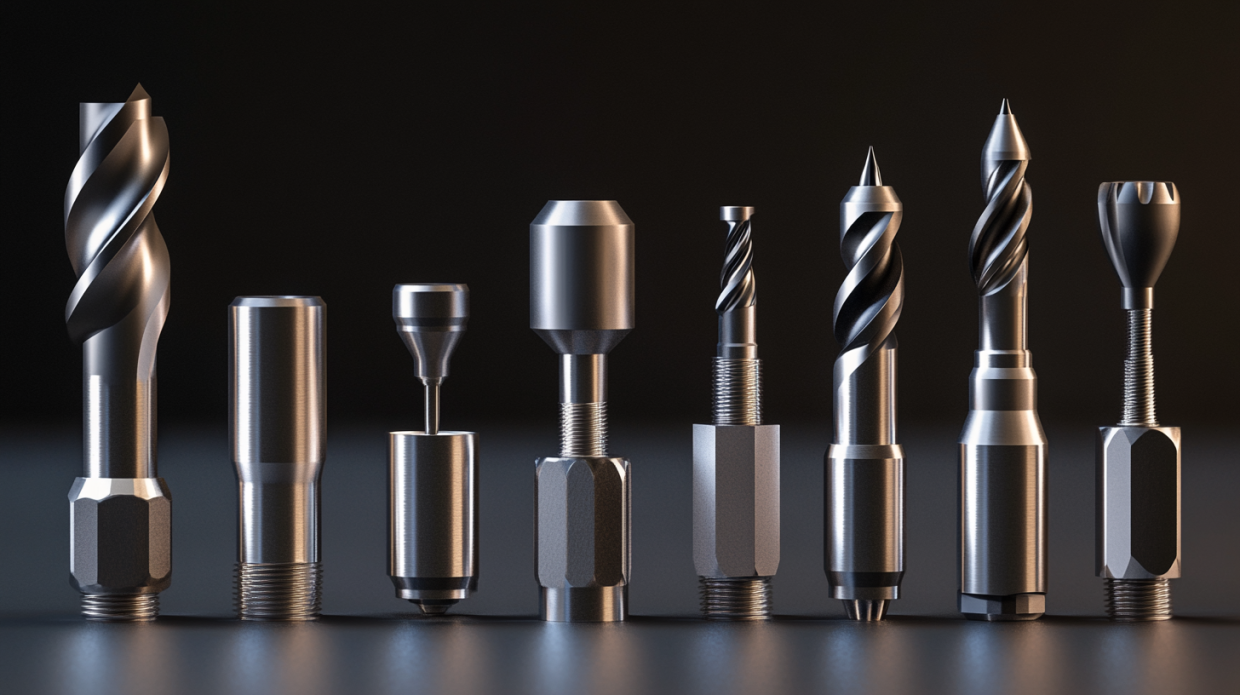
BAUER Carbide Router Bit Set, 15-Piece
- Controlled depth of cut minimizes kickback
- Precision-ground cutting edges stay sharper
- Durable C3 micrograin carbide for long life and excellent cut quality
Unlocking Your Woodworking Potential Without Breaking the Bank
In the world of woodworking, few tools are as versatile and transformative as the router bit. As your chisel to digital-age craftsmanship, the humble router bit can turn ordinary wood into extraordinary creations. Today, we’re diving deep into one of the market’s more accessible options: Bauer router bits. Whether you’re a weekend warrior building your first shop or a seasoned craftsperson seeking value without compromise, the right router bit can make the difference between a frustrating experience and woodworking bliss.
I still remember my first routing disaster. The bit caught, the wood splintered, and my project—a simple picture frame for my daughter’s artwork—was ruined. That day taught me that saving money on inferior tools often costs more in the long run. So when I first encountered Bauer router bits at Harbor Freight, I approached with caution. Three years and dozens of projects later, I’m ready to share everything I’ve learned.
Who Makes Bauer Router Bits and Where to Find Them
Bauer is Harbor Freight’s professional-grade power tool line, introduced to compete with mid-tier brands while maintaining the company’s value proposition. Yes, Harbor Freight does manufacture router bits under the Bauer brand name, positioning them as their higher-quality option compared to their budget-oriented house brands.
You can purchase Bauer router bits exclusively at Harbor Freight stores nationwide or through their online store. This limited distribution channel is both a blessing and curse—while it means fewer options for where to buy, it also simplifies the purchasing decision and often means more consistent pricing without the markup from intermediaries.
Speaking of pricing, Bauer router bits typically range from $9-15 for individual bits, with comprehensive sets starting around $40 for basic 5-piece collections and climbing to $100+ for larger professional sets. This pricing places them firmly in the mid-range category—more expensive than generic import bits but substantially less costly than premium brands like Freud, Whiteside, or CMT.
Set or Singles: How Bauer Router Bits Are Sold
Bauer offers both individual router bits and curated sets, giving woodworkers flexibility based on their needs and budget. Their most popular offering is the 15-piece set, which includes an assortment of essential profiles for about $80-90—representing significant savings compared to buying each bit individually.
For beginners just getting started, the Bauer 5-piece starter set includes the most commonly used profiles (straight bit, flush trim, roundover, chamfer, and 45° V-groove) for approximately $45. This collection provides enough versatility for most basic projects without overwhelming new woodworkers with specialized bits they might rarely use.
Experienced craftspeople often prefer purchasing individual bits as needed for specific projects. The individual bits range from basic straight bits at the lower end of the price spectrum to more complex architectural profiles commanding higher prices.
Technical Specifications: What You’re Actually Getting
Materials and Construction
Bauer router bits feature C3 micro-grain carbide tips brazed to steel bodies. While not the highest grade of carbide available (premium brands often use C4 or even C5 carbide), the C3 carbide provides a good balance of edge retention and durability for most hobbyist and light professional applications.
The bodies are machined from heat-treated steel, and most Bauer bits include anti-kickback design features that reduce the chance of the bit grabbing the workpiece—a particularly important safety consideration for less experienced users.
Shank Sizes and Compatibility
Bauer offers both 1/4″ and 1/2″ shank options, with the more popular profiles available in both sizes. The 1/2″ shank versions provide better stability and are recommended for heavier cutting operations, while the 1/4″ shank bits are compatible with smaller trim routers and laminate trimmers.
These bits are compatible with all standard routers that accept the corresponding shank size, including popular models from DeWalt, Makita, Bosch, and Porter-Cable. They’ll also work in Harbor Freight’s own Bauer router line, creating a cost-effective ecosystem for those invested in the brand.
Available Profiles and Sizes
The Bauer lineup includes most common profiles woodworkers need:
- Straight bits in various diameters (1/8″ to 1″)
- Round-over bits (1/8″, 1/4″, 3/8″, 1/2″ radii)
- Chamfer bits (15°, 22.5°, 30°, and 45°)
- Flush trim bits with various cutting lengths
- Rabbeting bits with bearing sets
- V-groove bits (45° and 90°)
- Cove bits
- Roman ogee profiles
- Dovetail bits in several angles
- Specialized bits like beading, core box, and panel pilots
This range covers approximately 80% of the profiles most woodworkers will ever need, though it lacks some of the more specialized architectural profiles found in premium brands’ catalogs.
Performance and Durability: The Real Test
The true test of any router bit isn’t the specifications or the price tag—it’s how they perform in the shop and how long they last. I’ve put Bauer bits through their paces on a variety of woods, from soft pine to rock-hard maple, and even some occasional work with plastics.
Edge Retention
Bauer bits hold their edge reasonably well through softwoods and moderately through hardwoods. With pine, poplar, and similar materials, you can expect dozens of linear feet of cutting before noticeable dulling. With harder materials like oak or maple, that distance decreases significantly—perhaps 25-40% of what you’d achieve with softwoods.
This performance places them squarely in the mid-tier category. They don’t match the edge retention of premium brands like Freud or Whiteside, which might maintain sharpness 2-3 times longer, but they significantly outperform generic bits costing half as much.
Material Compatibility
While primarily designed for woodworking, Bauer router bits can handle:
- All varieties of natural wood (softwood and hardwood)
- Manufactured wood products (plywood, MDF, particle board)
- Some plastics (with reduced speed settings)
- Soft non-ferrous metals like aluminum (though not recommended for regular use)
For plastic work, I’ve found them adequate for occasional use, but dedicated plastic-cutting bits with specialized geometries will perform better for those working regularly with these materials. Metal routing should be avoided except in emergency situations—while possible in soft aluminum, it drastically shortens bit life.
Heat Management
Heat is the enemy of carbide, and Bauer bits show average performance in this area. They lack the premium coatings found on high-end bits that help dissipate heat, but their body design does include some heat-reduction features like properly sized gullets that help clear chips efficiently.
During extended routing sessions, I’ve noticed they heat up more quickly than premium bits, requiring occasional pauses to cool down during heavy use. This is particularly apparent when making deep passes in hardwoods.
Comparing Bauer to Other Brands
To truly understand where Bauer fits in the market, we need to compare them against alternatives at different price points.
vs. Budget Bits (Generic imports, Harbor Freight house brand)
Bauer significantly outperforms true budget bits in almost every category:
- Edge retention is typically 2-3 times better
- Reduced vibration leads to cleaner cuts
- Better concentricity results in more accurate profiles
- Improved balance reduces router bearing wear
- Higher quality brazing means carbide tips rarely separate from the body
The price difference of $3-5 per bit compared to the absolute cheapest options is easily justified by these improvements.
vs. Mid-Tier Brands (Diablo, MLCS, Yonico)
Against direct competitors in the mid-tier space, Bauer holds its own but doesn’t necessarily stand out:
- Performance is broadly similar to other mid-tier options
- Edge retention is comparable
- Cut quality shows minimal differences
- Price point is competitive but not significantly lower
- The primary advantage is convenience if you’re already shopping at Harbor Freight
vs. Premium Brands (Freud, Whiteside, Amana, CMT)
Bauer cannot match the performance of genuine premium bits, which typically cost 2-3 times more:
- Premium bits maintain sharp edges 2-3 times longer
- Higher grade carbide (C4/C5 vs. C3) allows resharpening
- Superior anti-kickback designs enhance safety
- Better balance reduces vibration for cleaner cuts
- Specialized coatings reduce heat buildup and pitch accumulation
For professionals or serious hobbyists who route frequently, the premium brands’ advantages may justify their higher cost through longer life and better results. For occasional users, the value proposition of Bauer becomes more compelling.
The Storage Question: Protecting Your Investment
Most Bauer router bit sets come in a molded plastic case with custom-fit compartments for each bit. While not the rugged aluminum cases provided with some premium sets, these cases offer adequate protection for transport and storage. Individual bits come in plastic sleeves or boxes depending on the profile.
The cases include clear labeling for each bit position, making it easy to identify which profiles you have and to notice when one is missing. The hinges and latches are serviceable if not exceptional—I’ve had mine for three years with regular use, and while showing some wear, it still functions properly.
For those purchasing individual bits, I recommend investing in a separate storage solution. A purpose-built router bit storage cabinet or even a simple wooden block with appropriately sized holes will protect your bits from damage and make selection easier.
Practical Applications: What Can You Actually Build?
The true measure of any tool is what you can create with it. With a well-selected set of Bauer router bits, your project possibilities are extensive:
Furniture Making
For furniture projects, Bauer bits excel at:
- Creating decorative edge profiles on tabletops and shelves
- Cutting precise joinery like dadoes, rabbets, and grooves
- Flush trimming edge banding and veneers
- Forming panel raises for cabinet doors
- Cutting mortises for traditional joinery
Home Improvement
Around the house, these bits can handle:
- Crafting custom moldings and trim work
- Installing perfect-fitting hinges with template bits
- Creating custom signs and decorative elements
- Forming precise cutouts for electrical outlets or fixtures
- Fitting doors and creating jambs
Craft and Hobby Projects
For smaller projects, they’re perfect for:
- Carving intricate designs and patterns
- Creating inlays and decorative elements
- Forming precise edges on game boards and boxes
- Shaping custom picture frames
- Manufacturing jigs and fixtures for other woodworking tasks
Limitations and Considerations
No honest review would be complete without addressing limitations. Here are some important considerations when evaluating Bauer router bits:
Not Ideal for Production Environments
While suitable for hobbyists and occasional professional use, these bits aren’t designed for production environments where bits might run for hours daily. The edge retention and overall durability simply can’t match industrial-grade tooling in these scenarios.
Limited Specialty Profiles
Bauer offers a good range of common profiles but lacks the extensive specialty profiles available from larger brands. If you need unusual architectural moldings or specialized joinery bits, you may need to look elsewhere.
Resharpening Challenges
The grade of carbide used in Bauer bits makes professional resharpening difficult and sometimes impossible. Premium bits with higher-grade carbide can often be resharpened multiple times, extending their useful life and potentially offering better long-term value despite higher initial costs.
CNC Compatibility Concerns
While physically compatible with CNC machines, Bauer bits are designed primarily for handheld router use. They lack the specialized geometries, coatings, and rigorous tolerances of dedicated CNC tooling. For occasional CNC use they’ll function, but serious CNC operators should invest in purpose-designed bits.
Warranty and Support
Bauer backs their router bits with a 90-day satisfaction guarantee. This falls short of the lifetime warranties offered by some premium manufacturers but exceeds the minimal or non-existent warranties on budget bits.
In practice, Harbor Freight’s return policy is generally straightforward—if a bit fails prematurely due to manufacturing defects, they’ll typically replace it without much hassle within the warranty period. However, bits damaged through misuse or normal wear aren’t covered.
For support beyond simple returns, options are limited. Harbor Freight staff may be helpful but often lack specialized knowledge about routing techniques or bit selection. Online resources from the manufacturer are minimal compared to the extensive educational content provided by premium brands.
Making the Right Choice: Who Should Buy Bauer Router Bits?
After exploring every aspect of these bits, the question becomes: are they right for you? Here’s my recommendation based on different user profiles:
Perfect for Beginners and Occasional Users
If you’re just starting in woodworking or use your router occasionally for DIY projects, Bauer bits offer an excellent entry point. The value proposition is strong, allowing you to acquire a diverse set of profiles without breaking the bank. The performance is more than adequate for learning and occasional use.
Suitable for Budget-Conscious Hobbyists
For hobbyists who route regularly but are working within budget constraints, Bauer represents a sensible compromise. The performance-to-price ratio is favorable, especially for those who understand that bits are consumables and will eventually need replacement regardless of brand.
A Mixed Bag for Professionals
For professionals, the calculation becomes more complex. For less-used profiles or backup bits, Bauer can make economic sense. For your most frequently used profiles where performance and longevity directly impact productivity and quality, investing in premium bits will likely pay dividends through longer life and better results.
Real-World Use Cases
Let me share a few specific scenarios where I’ve used Bauer bits successfully:
The Kitchen Remodel
When renovating my kitchen, I used a Bauer roundover bit to soften the edges of all the open shelving and a rabbeting bit to create recesses for the cabinet door panels. After dozens of linear feet of cutting, both bits performed admirably with only minor dulling noticeable toward the end of the project.
The Custom Bookcase
For a built-in bookcase spanning an entire wall, I relied heavily on a 3/4″ straight bit for dados and a chamfer bit for decorative edges. The straight bit handled cutting joinery in plywood admirably, though I did notice it required more frequent cleaning to prevent burning when compared to premium bits I’ve used in the past.
The Sign-Making Weekend
When I decided to create custom signs for holiday gifts, I put the V-groove bit through its paces, carving lettering and designs into various hardwoods. The bit maintained acceptable sharpness through about 15 small signs before I noticed significant degradation in cut quality and increased effort required from the router.
Final Verdict: Value-Conscious Quality
After three years of using various Bauer router bits alongside both cheaper and more expensive alternatives, I can confidently say they occupy a valuable middle ground in the market. They’re significantly better than budget bits while being much more affordable than premium options.
For most home woodworkers and DIYers, Bauer router bits offer an excellent balance of performance, durability, and value. The comprehensive selection of profiles available in both individual bits and well-curated sets means you can build a versatile routing capability without excessive investment.
Are they the absolute best bits on the market? No—premium brands still hold that distinction. But they’re far from the worst, and the value proposition makes them worth serious consideration for anyone who doesn’t route professionally on a daily basis.
Whether you’re crafting your first cutting board or building custom cabinetry for your entire home, Bauer router bits provide the capability to create quality work without breaking the bank. And in woodworking, that accessibility means more people can experience the joy of creating something beautiful and functional with their own hands—and that’s something worth celebrating.
So next time you’re in Harbor Freight, take a closer look at those blue-labeled bits. They might just be the right balance of quality and value to take your woodworking to the next level without emptying your wallet.

